The date April 27 (2017) – “Bloody Thursday” is the final determining factor of what defines the steep political descent of VMRO-DPMNE’s decade-long regime and the day when the future of the new, post-gruevist political scene in the country was determined in a tragic way.
Following the elections on December 11, 2016, members and officials of VMRO-DPMNE protested by blocking the street in front of the main office of the State Election Commission, which was deciding on the complaints of the parties, with the explanation that they would not recognize the results of the re-election. At the protests, Nikola Gruevski announced that the process of “de-Sorosization” would begin, that is, that he would pursue all those who opposed his decade-long criminal regime.
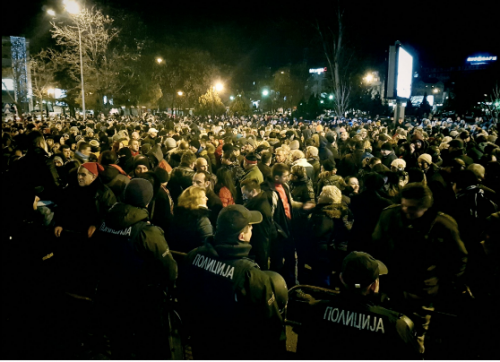
VMRO-DPMNE protests in front of the SEC, December 2016
Protests were held in the sign of explicit hate speech against the opposition and against all those who were not like-minded. Valentina Bozhinovska, then Chairperson of the Commission for Relations with Religious Communities announced that if the SEC decides on the complaints contrary to the wishes of VMRO-DPMNE, that there would be a “Night of the long knives”.
NIGHT OF THE LONG KNIVES
“Night of the long knives” is the name of the purge in Germany during the Nazi rule, a year after Hitler came to power in 1933. The purge was carried out from June 30 to July 2, 1934, when Hitler activated the execution squads in the operation known as “Kolibri”. At least 85, and according to some sources as many as 500 people were killed. Thousands ended up in prison with the assistance of the units of the ill famous SS, Gestapo and the secret police.
Following the elections in 2016, on December 16, the first court hearing was held for indictment by the SPO, in which Nikola Gruevski was accused for the events in front of the Municipality of Center in 2013.
On December 19, Gruevski’s announcement for “de-Sorosization” started in the form of financial controls by the Public Revenue Office on twenty civil society organizations, and on January 17, 2017, the association “Stop Operation Soros” was formed.
Previously, on January 7, 2017, representatives of the Albanian political parties in the country, DUI, the Alliance for Albanians and Besa, signed in Tirana a common platform consisting of seven points. They agreed on mutually achieving full equality in accordance with the Ohrid Agreement and the Constitution, economic equality, strengthening the rule of law, participation in the progress of the Euro-Atlantic integration process, creating a spirit of trust for good interethnic relations for political stability in the country, resolving the name dispute, good-neighborly relations and swift integration into NATO and the EU. The “Tirana” platform, as VMRO-DPMNE called it, was another one of the excuses that this party used to accuse the opposition for treason, federalization and changing the name of the country.
On January 23, SDSM and DUI concluded an agreement for a coalition and election of a new government.
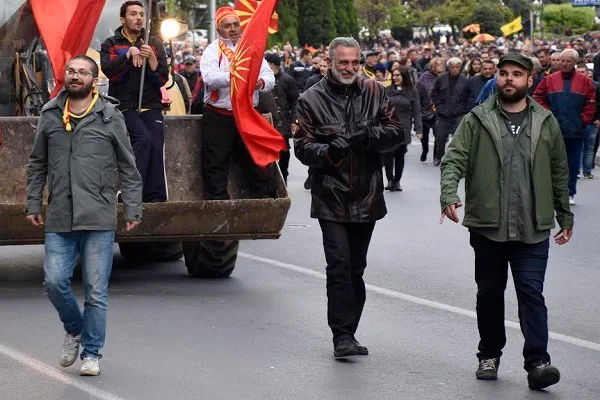
Igor Durlovski, Boris Damovski and Bogdan Ilievski, the organizers of the nationalist protests under the name “For a Common Macedonia”
An excuse for creating the initiative “For a Common Macedonia” was the revolt in regards to the decision made by Zoran Zaev, President of SDSM, to enter into negotiations for forming a government with the Albanian parties without rejecting the platform. In a television interview for Sitel, a day before the protests on February 26, Nikola Gruevski, President of VMRO-DPMNE, called on its membership to take to the streets with the words “all those who plan to sit at home and to watch TV believing that someone else will do their job to protect their country, are mistaken”.
The first protest was held on February 27 in Skopje in front of the Government. The protests were held in numerous cities and were supported by several public figures, including opera singer and Director of the Macedonian Opera and Ballet, Igor Durlovski, actors Vlado Jovanovski, Vasil Zafircev, Vanco Petrusevski and Goce Todorovski, handball players Kiril Lazarev and Indira Kastratovic, as well as pianist and then Director of the Emigration Agency Elena Misirkova Loza.
On January 28, Nikola Gruevski didn’t manage to form a government within the constitutionally provided period of 20 days following the handover of the mandate by Gjorgje Ivanov, then President of the country, who later refused to hand over the mandate to the President of the opposition party of SDSM, Zoran Zaev.
On March 1, SDSM President Zaev presented 67 MP signatures to Ivanov for receiving the mandate to form the new government with SDSM, DUI, the Alliance for Albanians and Besa.
BLOODY THURSDAY
“The night of the long knives” took place on April 27, 2017, when several hundred protestors from the association “For a Common Macedonia” attacked the Macedonian Parliament in order to prevent the election of Talat Xhaferi as Speaker of the Parliament. Following the violence that took place that night in the Parliament, April 27 was named “Bloody Thursday”.
“While the session for election of Talat Xhaferi as Speaker of the Parliament was underway, protests were being held in front of the Parliament by this association.
After the parliamentary session ended, at 6.00 pm, which was chaired by the Speaker of the previous parliamentary structure, Trajko Veljanoski, the MPs of the newly-formed parliamentary majority remained in the plenary hall to elect the new parliament speaker. MP Ferid Muhic, as the oldest of those present, chaired the session at which he appointed MP Goran Misovski as his deputy. Misovski continued to run the session and shortly after that Talat Xhaferi was elected as the new Speaker of the Parliament of the Republic of Macedonia. During this entire time and at the moment when Xhaferi was taking a solemn oath, VMRO-DPMNE MPs were yelling out that this was a coup.
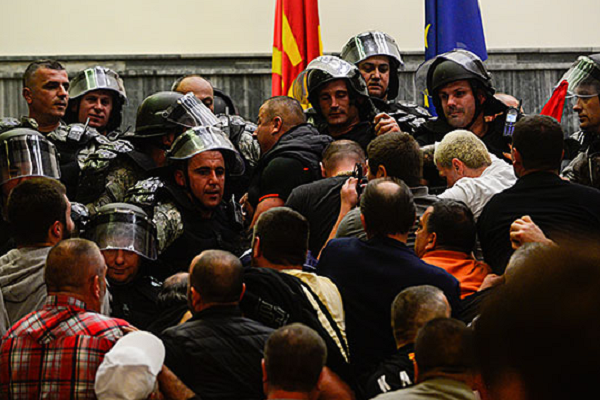
Around 7.00 pm, about 300 people who had participated in the protests, attacked the parliament. Some of them were masked. They got by the parliamentary security, after which they entered the hall for journalists where there was a press conference going on at the moment with the newly-elected Parliament Speaker, Xhaferi. The perpetrators physically attacked the MPs and journalists. At the time when the attackers entered, there were no police at all in the Parliament.
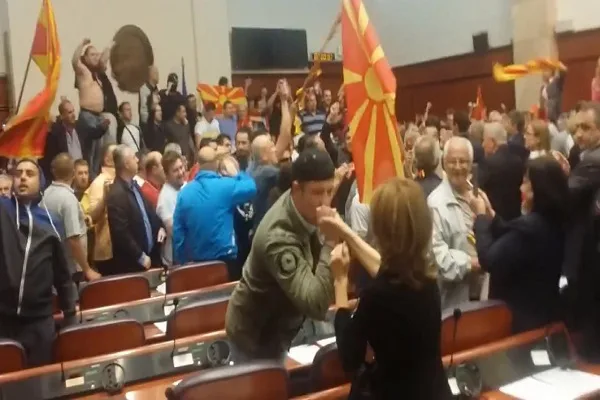
Some of the attackers on the Parliament saluted MPs from VMRO-DPMNE, and several of them kissed the hand of MP Elizabeta Kanceska Milevska. According to security cameras, the doors of the parliament were opened by MPs Krsto Mukoski and Saso Vasilevski, whereas MP Johan Tarculovski and Veljanovski’s personal security directed the perpetrators to the hall where the MPs from SDSM were.
Zijadin Sela and Zoran Zaev suffered serious injuries. MP Sela fell unconscious after the brutal attack, while footage from the camera in the Parliament, which CIVIL Media first published, testified to how the perpetrators dragged him on the floor and kicked him, in an obvious attempt to kill him. Sela ended up in the hospital with fractures and concussions in the brain and in serious life danger. Zoran Zaev, Oliver Spasovski, Ljupco Nikolovski, Damjan Mancevski, Maksim Dimitrievski and Radmila Sekerinska were with visible injuries and blood on their face.
The police responded only three hours after the attack on the Parliament, and later, then Minister of Interior Agim Nuhiu stated that the Director of the Bureau of Public Security, Mitko Chavkov, had deliberately hindered police intervention, as well as that during the attack, Chavkov hadn’t been available on his phone for two hours.
The MPs were evacuated from the Parliament around midnight, and the police dispersed the protestors and attackers with stun grenades.
That night, 70 citizens, 22 police officers and three MPs had sought medical help in the hospitals in Skopje.
Then President Ivanov, in his address late that night, called the presidents of all parliamentary parties to a meeting in his cabinet, but didn’t condemn the attack. Zaev and Ahmeti rejected the invitation, pointing out Ivanov as one of the reasons for the crisis.
AFTER BLOODY THURSDAY…
Two days after the attack on the Parliament, the Public Prosecutor’s Office requested from the MoI to detain 15 participants, among which also the organizers of the protests Bogdan Ilievski, Boris Damovski, opera singer Igor Durlovski and actor Vlado Jovanovski.
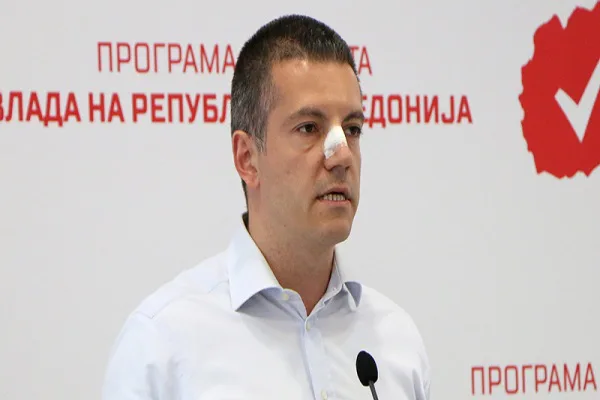
Damjan Mancevski at a press conference
The next day, Damjan Mancevski at a press conference in the headquarters of SDSM, pointed out with a name and a photo some of the attackers who beat MPs. Among them were names of former prisoners convicted of serious crimes, employees in the police, army and state administration, as well as people close to the leadership of VMRO-DPMNE.
The persons pointed out by Mancevski were:
– Dimce Hristoski — double killer and former member of the “Lions” unit
– Nikola Mitrevski — convicted three times to a prison sentence
– Igor Jug — convicted of rape and murder, member of the newly-formed “patriotic associations”
– Goran Angelov — member of the newly-formed “patriotic associations”
– Munir Pepic — employed in the Intelligence Agency
– Mitko Mihajlovski — employed in the MoI
– Andrej Iliev — Lieutenant colonel in the ARM
– Aleksandar Atanasov — Director of Public Enterprise Water Supply and Sewerage
– Martin Stojanovski — employed in the Agency for Promotion of Agricultural Development
– Jordan Mijalkov — son of Sasho Mijalkov, former director of UBK (Administration for Security and Counterintelligence)
– Adnan Memed — Chief of Cabinet of Elvis Bajram, Mayor of the Municipality of Shuto Orizari
– Predrag Petrusevski — Tarculovski’s security
Minister of Interior Nuhiu stated that the police had failed in dealing with the crowd and that he would seek responsibility for the late reaction. VMRO-DPMNE MP and leader Gruevski, who is charged for organizing the bloody Thursday and who during the attack was in Vienna, accused SDSM for the incident, saying that with this they wanted to distract the public attention from the election of Xhaferi as Parliament Speaker. Besa stated that the violence in the Parliament was a coordinated action between the police and VMRO-DPMNE. The Alliance for Albanians called for calmness, concluding that Gruevski’s totalitarian regime had come to an end.
In June the same year, the MoI prepared a report on the police oversights during the violence in the Macedonian Parliament. 23 police officers were suspended from work, and a disciplinary measure was initiated for 45.
33 people were accused for the events in the Parliament. They were prosecuted for terrorist endangerment of the constitutional order.
Of the multiple accused, only Igor Durlovski was acquitted of all charges.
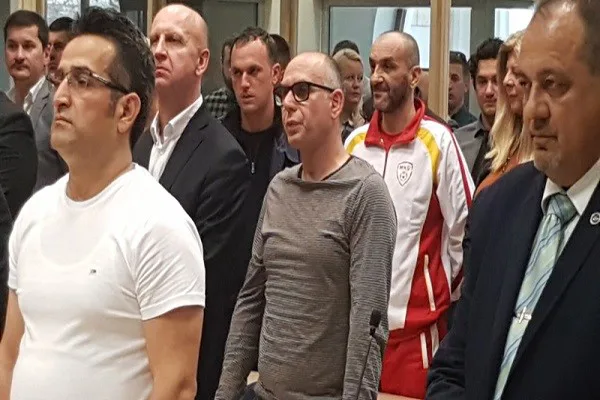
From the trial for April 27
Former Director of the Bureau of Public Security Mitko Chavkov was sentenced to 18 years in prison, while police chiefs Mitko Peshov, Dushko Lazarov, Goran Gjoshevski were sentenced to 15 years in prison. Oliver Popovski was sentenced to 13 years in prison, Munir Pepic to 15 years, Abduljfeta Alimi to 7 years, Oliver Radulov to 10 years, Jane Chento to 15 years, Igor Jug to 12 years, Aleksandar Vasilevski-Ninja to 8 years, Nikola Mitrevski-Koljo to 15 years, Mladen Dodevski to 12 years, Gorance Angelovski to 12 years, Vlatko Trajkovski to 15 years and Vilijam Mihajlovski to 14 years in prison.
Fifteen of the accused were granted an amnesty under the Law on Amnesty. A positive opinion to the requests for amnesty was issued for five MPs – Mukoski, Arnaudov, Vasilevski, Tarchulovski and Dimovski, to the organizers of the initiative “For a Common Macedonia” Bogdan Ilievski, Vlado Jovanovski and Boris Damovski, to the employees in the Cabinet of the then Parliament Speaker Ivan Cvetanovski and Elena Docevska-Bozhinovska, the Miladinovski brothers who first revealed details about the organization of bloody Thursday and Zaharije Simovski, Ilija Slavevski and Mitre Pitropovski from the patriotic associations.
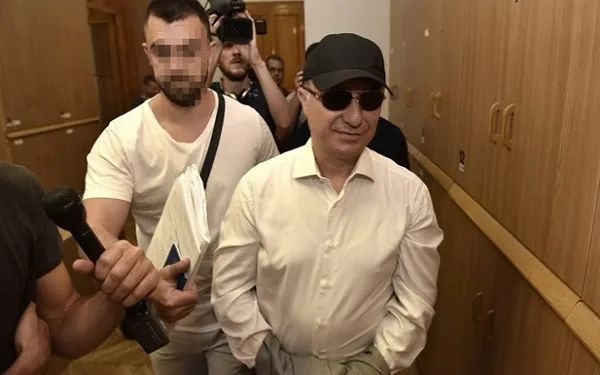
The investigation on former Prime Minister Nikola Gruevski, who is in exile in Budapest, as well as on ex-intelligence officer Nikola Boshkovski, as part of the organizers of Bloody Thursday, has been stopped, until they become available to the prosecution authorities.
The trial for the organizers of the violence is still in progress, and Trajko Veljanovski, Spiro Ristovski, Mile Janakievski and Vladimir Atanasovski have also been accused in this case.
That April 27, 2017 will remain to be noted as a date when an attempt to kill democracy was made.
by: Diana Tahiri and Maja Ivanovska
translation: N. Cvetkovska

